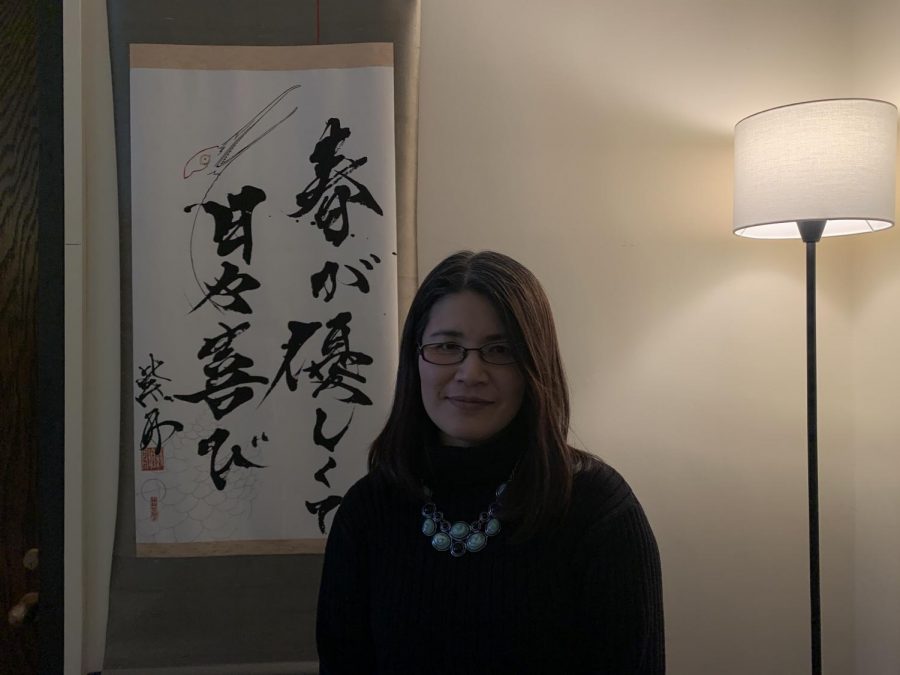The University of Massachusetts East Asian Languages and Cultures program is celebrating its 50th anniversary this year by putting on a number of theatrical and social events.
The program was established in 1969 by Professor William E. Naff, who started the curriculum in Chinese and Japanese language and literature. Since then, it has also grown to include a certificate in Korean, added this past year.
“We have here at UMass a kind of anomalously large East Asian program for the kind of University we are,” said Bruce Baird, the program director. “If you look around at other midsized public universities, we have more faculty members and more majors than all those universities.”
The program, which fits under the Languages, Literature and Cultures department at UMass, emphasizes both East Asian language and cultures, offering a wide breadth of classes including “literature, religion, linguistics, second-language pedagogy, politics and diplomacy, popular culture, women’s studies, gay/queer studies and film studies,” according to their website.
Baird described it as “a phenomenal amount of coverage.”
To celebrate, the program will be putting on a Chinese ritual folk music concert performed by the Zhou Family Band, a roundtable discussion and a concert of traditional Japanese music featuring shakuhachi and koto instruments.
There will also be an alumni luncheon held in April to build connections between past and current students.
“We’re hoping that alumni will bring their kids with them. And for that we asked the Japanese Students Association to have a table where the kids can play with Japanese toys,” said Reiko Sono, a senior lecturer and the Japanese undergraduate advisor.
Sono, who has been coordinating the celebration this semester, said that she saw the 50th anniversary as an opportunity to raise more awareness and get more funding for the program.
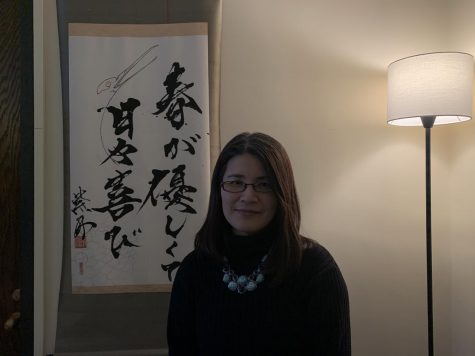
“My main goal is to start this Student Assistance fund, and we would like to use those funds to support students who are doing internships [abroad],” she said. “We would also like to use the fund to start a translations contest because the dominant aspiration of our students is to become a translator.”
In recent years, some students of the program have received awards in translations competitions, such as Sam Bett, who won the Japan-United States Friendship Commission Prize in 2019 and Jenny McKeon, who won first prize at the Manga Translation Battle.
Today, the Languages, Literatures and Cultures department has 405 undergraduate majors, with roughly 75 enrolled in the Japanese and Chinese programs, according to Sono. She stated that the program peaked around 2010.
However, when the program began 50 years ago, it was very small. Called the Asian Studies Program, it had only about a dozen professors and few students.
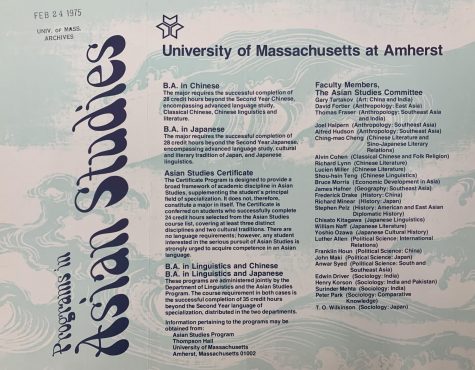
Sono described the faculty at the time: “The interesting thing is that, professors, rather than focusing on their research, thought that the way to get more students was to focus on teaching. So, for four years they really wanted to give students a really good education. And that’s how they started to get more people.”
Alvin Cohen, professor emeritus in Chinese and one of the first faculty members in the program, stated at the time of its conception, the program had few students because “Chinese and Japanese languages were on the fringes.” He said, “The news hardly said anything about those places.
“It took a very curious and very gutsy kind of student just to walk in the door, and so I always had a lot of delightful fun students in my classes because it attracted all sorts of wonderful characters, but there was not much quantity, and the deans always liked quantity.”
To try to bring in more students, professors signed up in shifts to recruit in the Campus Center, setting up a table with pictures, signs and a TV playing a video.
“We were trying to get students to say ‘look, the world is bigger than just your European end of it. There’s lots and lots of interesting people elsewhere,’” said Cohen.
In 1977, the program faced great challenges when the provost at the time, Paul L. Puryear, unveiled his five-year plan for the University.
According to the Collegian at the time, under Puryear’s plan, Asian Studies was “slated for elimination by 1982.”
“Of course, everybody talks to everybody, so we found out there were other departments who were cut to zero, and then some departments were just slashed rigorously [with] big cuts in their budget,” said Cohen.
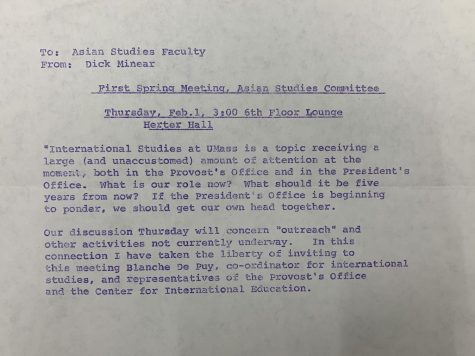
He recalled that, as a result of the budget cute, the room at the next faculty senate meeting “was just overflowing with people.”
On April 20 of that year, 300 students and faculty from the Asian Studies and Slavic Languages programs demonstrated at Whitmore to protest the provost’s five-year plan and budget cuts. The group also collected roughly 5,000 signatures petitioning against the elimination of the program.
Eventually, Puryear began even firing deans, however, the Chancellor at the time stepped in, firing the provost and rescinding the budget cuts.
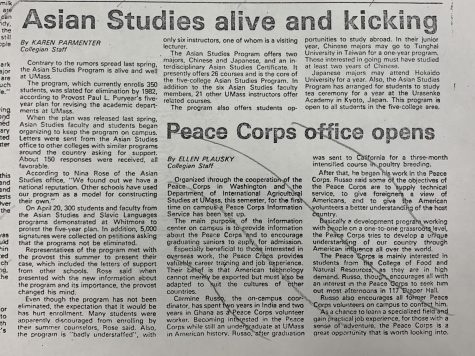
In 1980, the program was formally raised to the status of a department, changing its name to the Department of Asian Languages and Literatures.
However, since its founding, the program had its own budget accounts, faculty and staff positions and set offices, giving it a “de facto departmental status,” according to the 1980 Long-Range Planning Status Report.
Thus, the change did not entail “any change in budgeting, structuring or curricular offerings.” At the time, the department was the only one awarding bachelor’s degrees in Chinese and Japanese in New England.
The program grew significantly in the 1990s, around the same time in which a Master of Arts degree was added.
“We started from nothing and became very successful in spite of some really crappy support, both monetarily and administratively,” said Cohen. “We came out of left field and did a good job.”
The program came to be as it is today in 2006, when the department was pushed together with four others to create the Languages, Literatures and Cultures department, receiving some pushback from many faculty members.
“We had to figure out a way to all work together and get along, and how we were going to structure this new department,” Cohen said. “But there were a lot of unhappy campers.”
“I loved teaching and I loved the students, I just had the nicest students. It was just such a pleasure to go to class every day. But all the administrative fighting just burned me out.”
Today, faculty members claim to be more pleased with the way in which the University looks upon the department.
Baird, who teaches a course on manga and anime, Japanese video games and Japanese theater, said “UMass is very open to different kinds of classes and different kinds of research, just as an institution. The fact that I want to teach a manga and anime class or a Japanese video game class doesn’t bother anyone here… There are definitely colleges and universities around the country where you would get pushback for that.”
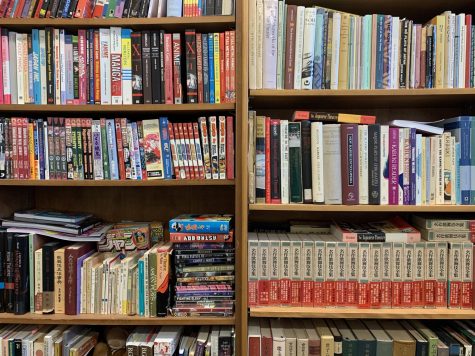
“These classes really allow us to talk about some of the most important issues of our contemporary era,” he continued, “like ‘what’s the relationship between people and technology?’”
Speaking about what drew her into the program, master’s Japanese student Clara Marino said, “I think for me, one of the big positives and really special things is that the faculty cover a really diverse range of topics.”
Sono spoke about how impressed she is by the diligence of the students in the program.
“I have worked closely with Honors students, and many of them decide to translate very obscure Japanese as their honors project,” she said. “Usually I meet with them every week and go over chunks, and it’s really hard but through that process, I can see students grow, and that’s always so rewarding.”
Besides the student assistance fund she hopes to start, Sono also has other hopes for the future of the program.
“Within this big department of language, I don’t feel that there are so much connection among us,” Sono said. “But now that the world is physically really connected with each other, I think we should too.
“I would also like to see a connection between us and the local communities… All [our] events… are all free and open to the public so I want people in the community to come and enjoy Japanese and Chinese culture.”
Baird also touched on greater community outreach. “The kind of thing that I would like to see in the future is that we keep serving populations of Americans… and international populations that are important and have value to add to our world.”
Irina Costache can be reached at [email protected] and followed on Twitter @irinaacostache.

